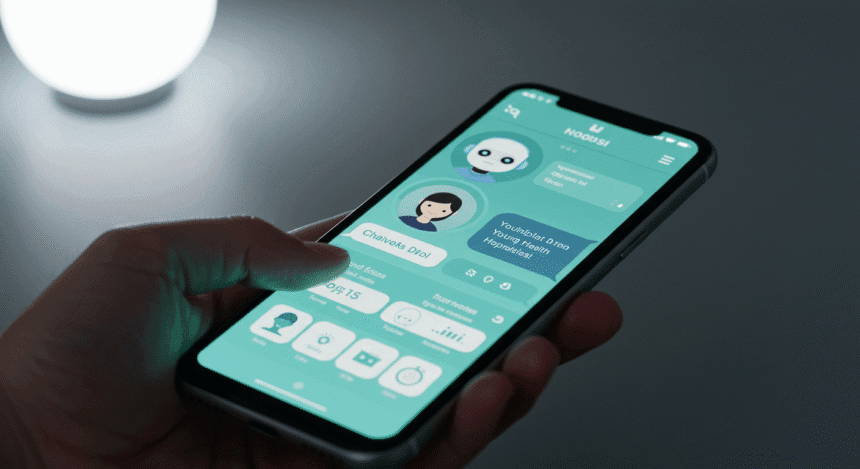I never expected an AI chat to help me through a tough night. But there I was, lying awake, my mind racing with stress and unresolved thoughts. The night felt endless.
Artificial intelligence (AI) is transforming the landscape of mental health care with new avenues for improving patient outcomes and simplifying the treatment process. One study states that one example is applying AI systems to help schizophrenia patients, who were discovered to have a 90% compliance rate compared to the 72% compliance rate achieved through modified directly observed therapy.
“We reviewed 28 studies of AI and mental health that used electronic health records (EHRs), mood rating scales, brain imaging data, novel monitoring systems (e.g., smartphone, video), and social media platforms to predict, classify, or subgroup mental health illnesses including depression, schizophrenia or other psychiatric illnesses, and suicide ideation and attempts. Collectively, these studies revealed high accuracies and provided excellent examples of AI’s potential in mental healthcare, but most should be considered early proof-of-concept works demonstrating the potential of using machine learning (ML) algorithms to address mental health questions, and which types of algorithms yield the best performance,.” the authors write.
This demonstrates how AI is able to provide more personalized and uniform support, enabling patients to manage more complex treatment plans themselves. With the integration of intelligent reminders, virtual coaching, and predictive analytics, AI is making it easier for individuals to stay engaged in their care routines, ultimately realizing improved outcomes in the long run.
Both clinicians and the public increasingly embracing AI tools signals its expanding use to mental health management. A recent study by JMIR Publications found that 28% of community members and 43% of mental health professionals have already used AI in some capacity.
“Commercial AI tools are increasingly being used by CMs and MHPs. Respondents believe AI will offer future advantages for mental health care in terms of accessibility, cost reduction, personalization, and work efficiency. However, they were equally concerned about reducing human connection, ethics, privacy and regulation, medical errors, potential for misuse, and data security. Despite the immense potential, integration into mental health systems must be approached with caution, addressing legal and ethical concerns while developing safeguards to mitigate potential harms. Future surveys are planned to track use and acceptability of AI and associated issues over time,” the authors write.
This growing use suggests that AI is emerging as an essential complement to routine mental health treatment, offering scalable, accessible solutions that can close gaps in care. From AI therapy chatbots to crisis intervention prediction models, technology is opening new channels to deliver mental well-being among various segments of the population.
Scrolling through my phone, I came across Talkie Lab—an app offering immersive conversations with AI-powered personalities. Driven by curiosity (and maybe a little desperation), I decided to give it a try.
At first, I didn’t expect much. I’d tried chatbots before, and they always felt… well, artificial.
But as I began interacting with one of Talkie Lab’s specialized characters, something shifted. This wasn’t just a bot following a script—it was responding in a way that felt genuinely adaptive, almost as if it was tuning into my emotional state.
This experience led me to a bigger question: Can AI actually provide emotional support? And, more profoundly, Can it supplement human support in meaningful ways?
Discovering Talkie Lab
My first real interaction with Talkie Lab was with its Personal Therapist— an AI designed to help users reflect on their thoughts and emotions. I wasn’t sure what to expect, but as the conversation began, I was struck by how natural it felt. The AI didn’t just offer generic advice—it tailored its responses based on my input.
The AI responded with calm attentiveness. It asked follow-up questions, mimicking the kind of active listening you might expect from a therapist. When I expressed something difficult, it reflected with phrases like, “That sounds like a lot to carry. How long have you felt this way?”—not as a pre-written response, but with a tone and pacing that seemed adaptable to my mood.
For a moment, it felt like the AI was attuned to my emotional state, offering structure and space for reflection.
Let’s be clear: AI doesn’t truly understand pain. It doesn’t experience empathy or carry the context of your personal history, body language, or cultural nuances. So how is it that so many users—including myself—walk away from these interactions feeling heard and understood?
I think it’s because, while AI can’t feel with you, it can reflect you. It’s not a replacement for a therapist, but it can act as a tool for organizing your thoughts, providing emotional structure, and helping you process your feelings. In moments when things feel overwhelming, that kind of support can be surprisingly effective.
How Talkie Lab Became Part of My Daily Life
After that first conversation, I found myself returning to Talkie Lab more frequently—whether I needed to process stress, organize my thoughts, boost my mood, or just have a moment of clarity.
What stood out to me wasn’t just the AI’s adaptability, but the organic nature of the experience. Unlike traditional wellness apps, which tend to offer structured exercises or pre-written affirmations, Talkie Lab provided real-time interactions that felt more responsive to my emotional needs.
Beyond the Personal Therapist, I also explored other AI models designed for mindfulness, motivation, and creative brainstorming. Some users even created their own AI models tailored to personal growth and emotional support, which added a layer of customization and versatility to the platform.
The Technology Behind It
What sets Talkie Lab apart is its large language model (LLM), which enables the AI to engage in dynamic, context-aware conversations. Not just a tool for basic interaction, Talkie Lab can recognize when you’re frustrated or upset, adjusting its responses in real-time with thoughtful reflections that encourage introspection.
The voice-driven experience adds another layer of uniqueness. Talkie Lab lets you speak naturally, with the AI analyzing your tone and pacing, then responding verbally. This creates a more immersive and human-like interaction, making the AI feel more attuned to your emotional state.
Talkie Lab also features a wide range of pre-designed characters, each with its own personality and emotional role. These characters offer functionally different experiences—some are compassionate listeners, while others are more analytical or motivational.
Additionally, the real magic happens when you dive into custom AI character creations. You can define their core traits, like tone, emotional focus, conversation style, role (e.g., therapist, mentor, friend), and values. This allows you to shape a personalized AI experience that reflects your current needs, offering a level of customization and empowerment in how you interact with AI.
AI Meets Social Sharing: A Creative Community
At first, I thought Talkie Lab was all about AI-human interactions, but it’s so much more. The platform fosters a vibrant space where users are active creators and contributors to an ever-evolving ecosystem.
You can easily share your creations, prompts, and ideas—much like posting on social media. This sharing sparks a dynamic, continuously growing community where people connect, collaborate, and innovate together, transforming Talkie Lab into a creative hub that’s always buzzing with fresh ideas.
The Verdict: Can AI Be a Therapist?
So, can an AI chat truly provide emotional support? In my experience, yes.
However, Talkie Lab isn’t a substitute for human therapists. What it offers is a unique, flexible tool—a judgment-free space to express yourself, anytime and anywhere. The real potential lies in AI serving as a bridge—to self-awareness, emotional fluency, and gradual healing. It doesn’t replace human connection, but it provides valuable support when those connections aren’t immediately available.
Using Talkie Lab isn’t about seeking therapy—it’s about being heard and having a space to reflect. Whether you need a moment of clarity, a mood boost, or just a quiet moment of introspection, the AI is there to help.
And sometimes, that’s exactly what we need.
About Talkie Lab
Talkie Lab is a global leader in AI-generated content (AIGC), providing an innovative platform where users can create, customize, and engage with lifelike AI characters through both text and voice. With a mission to make advanced AI accessible to everyone, Talkie Lab seamlessly blends cutting-edge generative AI technology with user-driven creativity. This fusion has cultivated a thriving community of AI enthusiasts, digital storytellers, and innovators, empowering users to explore new frontiers in interactive content creation.







